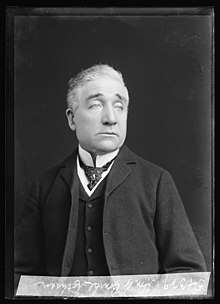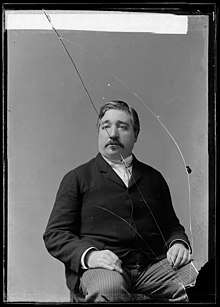William Bourke Cockran
William Bourke Cockran (February 28, 1854 – March 1, 1923), commonly known as Bourke Cockran, was an Irish-American politician. His name sometimes appears as Burke Cochran in contemporary newspaper reports. He served as a United States Representative from the East Side of Manhattan for seven terms.
William Bourke Cockran | |
|---|---|
 Cockran at C. M. Bell's studio | |
| Member of the U.S. House of Representatives from New York | |
| In office March 4, 1887 – March 3, 1889 | |
| Preceded by | Abraham Dowdney |
| Succeeded by | Roswell P. Flower |
| Constituency | 12th district |
| In office November 3, 1891 – March 3, 1895 | |
| Preceded by | Francis B. Spinola |
| Succeeded by | George B. McClellan Jr. |
| Constituency | 10th district (1891–93) 12th district (1893–95) |
| In office February 23, 1904 – March 3, 1909 | |
| Preceded by | George B. McClellan Jr. |
| Succeeded by | Michael F. Conry |
| Constituency | 12th district |
| In office March 4, 1921 – March 1, 1923 | |
| Preceded by | Thomas F. Smith |
| Succeeded by | John J. O'Connor |
| Constituency | 16th district |
| Personal details | |
| Born | February 28, 1854 County Sligo, Ireland |
| Died | March 1, 1923 (aged 69) Washington, D.C., U.S. |
| Political party | Democratic Party |
Cockran switched parties four times, but is best known as a Democrat. He was a leading orator of the late 19th and early 20th century, and an important influence on British statesman Winston Churchill, who noted that Cockran was a pacifist and capitalist, who vigorously fought against socialists, silver inflationists and advocates of high tariffs.[1]
Early life and education
Born in Carrowkeel, County Sligo, Ireland, he was educated in France and in his native country, and emigrated to the United States when seventeen years of age. He was a teacher in a private academy and principal of a public school in Westchester County, New York. He studied law, was admitted to the bar in 1876, and practiced in Mount Vernon, New York; two years later, he moved to New York City and continued the practice of law. A devout Roman Catholic, he became deeply involved in support of Irish nationalism.[2]
Career

Beginning in 1886, Cockran, a Democrat, was a frequent candidate for the US House of Representatives and won several times; he served a number of non-consecutive terms. He was a delegate to the Democratic National Conventions in 1884, 1892, 1904, and 1920. At the 1920 convention, he delivered the nominating speech for Al Smith.[3]
Cockran was a member of the commission to revise the judiciary article of the New York Constitution in 1890. Cockran publicly broke with his party in 1896, opposing the Free Silver platform of Democratic presidential candidate William Jennings Bryan. Cockran campaigned instead for Republican presidential candidate William McKinley, which helped bring Gold Democrats over to McKinley's winning coalition.
In 1900, Cockran returned to the Democratic Party, supporting Bryan's second presidential campaign. Cockran returned to Congress in 1904 after he won a special election to fill the seat of George B. McClellan Jr., who had resigned to become mayor of New York City. He served his final years, 1921–1923, as a congressman, dying in Washington, D.C. He is buried in Gate of Heaven Cemetery, Hawthorne, New York.
Cockran, a friend of Britain's Churchill family and reputed one-time lover of Jennie Churchill, introduced her 20-year-old son, Winston Churchill, to American high society during Churchill's first trip to New York in 1895. Years later, Churchill credited Cockran as his first political mentor and the chief role model for his own success as an orator. Churchill wrote in the 1930s that Cockran was, "A pacifist, individualist, democrat, capitalist, and a 'Gold-bug'....He was equally opposed to socialists, inflationist, and Protectionists, and he resisted them on all occasions." Churchill never became a pacifist but he did adopt all the rest of Cockran's stances during his own political career, and carefully read and reread his speeches for oratorical advice.[4] Churchill quoted Cockran in his 1946 "Iron Curtain speech" recalling: “words which I learned 50 years ago from a great Irish-American orator, a friend of mine, Mr Bourke Cockran: ‘There is enough for all. The earth is a generous mother. She will provide, in plentiful abundance, food for all her children, if they will but cultivate her soil in justice and in peace.’”
Alice Roosevelt Longworth provides recollections of Cockran in her early autobiography "Crowded Hours".[5] As she recalls, Cockran was "an Anglophobe in public and an Anglomaniac in private."[5] In 1901, he was awarded the Laetare Medal by the University of Notre Dame, the oldest and most prestigious award for American Catholics.[6]
See also
- List of United States Congress members who died in office (1900–49)
References
- Andrew Roberts, Churchill: Walking with Destiny (2018) p 35.
- Eoin Butler, "The Irish orator who taught Winston Churchill how to win a crowd. Irish Times February 17, 2017, 15:5]
- James McGurrin, Bourke Cockran: a free lance in American politics (Arno Press, 1972).
- Andrew Roberts, Churchill: Walking with Destiny (2018) p 35.
- Longworth, Alice Roosevelt (1933). Crowded hours. New York, London: C. Scribner's Sons. pp. 78–79. OCLC 689757741.
- "Recipients | The Laetare Medal". University of Notre Dame. Retrieved 2 August 2020.
Further reading
- Gibson, Florence E. The attitudes of the New York Irish toward state and national affairs, 1848-1892 (AMS Press, 1951).
- Kennedy, Ambrose. American Orator: Bourke Cockran; His Life and Politics (1948). 225 pp.
- McElroy, Robert, ed. In The Name Of Liberty: Selected Addresses Of William Bourke Cockran (1925)
- McGurrin, James. Bourke Cockran: a free lance in American politics (Arno Press, 1972). Online review
- Stovall, Richard Lee. "The rhetoric of Bourke Cockran: a contextual analysis" (PhD dissertation, The Ohio State University, 1975). Online
- . Thom's Irish Who's Who. Dublin: Alexander Thom and Son Ltd. 1923. pp. 40–41.
- United States Congress. "William Bourke Cockran (id: C000575)". Biographical Directory of the United States Congress.
External links
| Wikimedia Commons has media related to William Bourke Cockran. |
- William Bourke Cockran at Find a Grave
- Mrs. Bourke Cockran on woman suffrage From a scrapbook in the Carrie Chapman Catt Collection in the Rare Book and Special Collection Division at the Library of Congress
| U.S. House of Representatives | ||
|---|---|---|
| Preceded by Abraham Dowdney |
Member of the U.S. House of Representatives from New York's 12th congressional district 1887–1889 |
Succeeded by Roswell P. Flower |
| Preceded by Francis Spinola |
Member of the U.S. House of Representatives from New York's 10th congressional district 1891–1893 |
Succeeded by Daniel Sickles |
| Preceded by Joseph J. Little |
Member of the U.S. House of Representatives from New York's 12th congressional district 1893–1895 |
Succeeded by George B. McClellan Jr. |
| Preceded by George B. McClellan Jr. |
Member of the U.S. House of Representatives from New York's 12th congressional district 1904–1909 |
Succeeded by Michael Conry |
| Preceded by Thomas F. Smith |
Member of the U.S. House of Representatives from New York's 16th congressional district 1921–1923 |
Succeeded by John J. O'Connor |